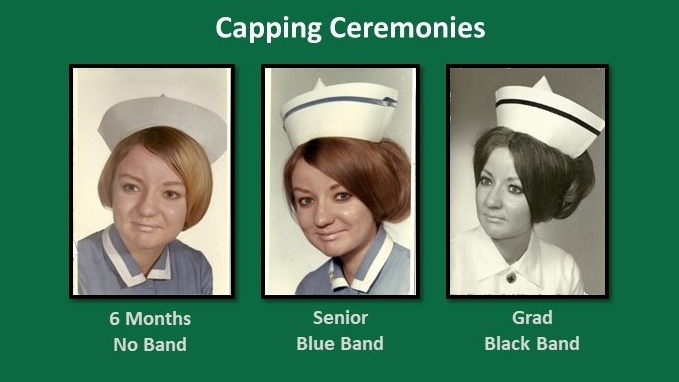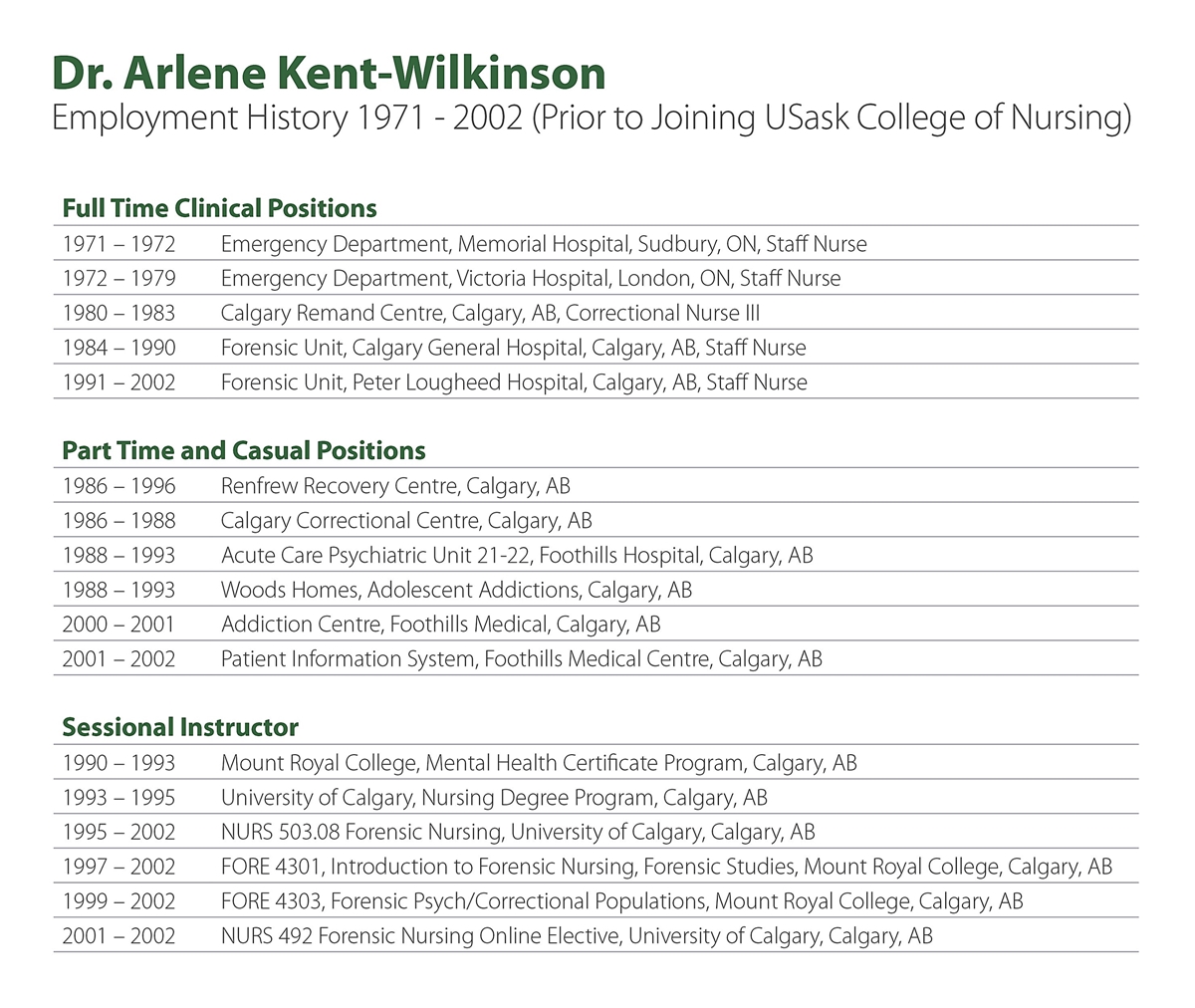
Celebrating 50 Years as a Registered Nurse
When Dr. Arlene Kent-Wilkinson became a registered nurse in 1971 she could have never imagined the changes the profession would see over the next 50 years.
From capping ceremonies, wages of $2.80/hour, and the regularization of degree nursing programs to PhD prepared nurses, the introduction of an online national licensure nursing exam, and nurses now being viewed as heroes during a world pandemic, Dr. Arlene Kent-Wilkinson (PhD) has seen a lot over her 50 year career as a registered nurse.
Dr. Kent-Wilkinson began nursing school in Sault Ste. Marie, Ontario when most nursing programs across Canada were three-year hospital-based programs (apprenticeship model) – students lived in residence, uniforms, caps and linens were laundered in the hospital laundry, and meals were ate at the hospital cafeteria…. everything was free. In fact, students were paid $15 a month to buy nylons and any personal items they required. The year was 1968.

Three years later in 1971, Kent-Wilkinson completed her nursing diploma. “I have so many fond memories of my time in nursing school,” says Kent-Wilkinson. “In my first year, the capping ceremony to celebrate our progression in the program; entering the hospital cafeteria for the first time and quickly observing and adhering to the distinct hierarchy of positions which dictated when you walked through the door, and standing up when a physician came into the nursing station. In my second year, the highpoint, was going on the established nursing affiliations, which gave student nurses the opportunity to travel and work at other hospitals throughout Ontario, which included the Hospital for Sick Children (SickKids), the Princess Margaret Cancer Centre, and North Bay Psychiatric Hospital. And during my third and final year, we had the opportunity to work on every unit of the hospital and our confidence increased with team-leading experience”.
But her education didn’t stop there. Between working full time, getting married, and having two sons, she continued on to complete her Post-RN Bachelor of Science in Nursing (BSN) degree in 1990, her Master of Nursing (MN) in 1993, and her Doctor of Philosophy (PhD) in 2008. In 2012, she completed her Canadian Psychiatric Mental Health Nursing certification (CPMHN [c]) and renewed it again in 2018. Dr. Kent-Wilkinson is a life-long learner.
Upon completion of her diploma nursing program in 1971, Dr. Kent-Wilkinson entered the workforce in her first nursing position at Memorial Hospital in Sudbury, ON. Here she worked as a full time staff nurse in the emergency department, then moved to London, ON, where she continued to work in emergency.

“In 1980, I turned 30 and there was a recession in Ontario, but a boom out west,” said Kent-Wilkinson. “Lots of people I knew where excited about moving to either Calgary or Vancouver. It was a big move, but at the time, I had no ties. In contemplating the move, I remember thinking I did not want to turn 40 and forever wish I had made the move when I was 30. So, I sold my condo and drove to Calgary.”
For the next twenty-one years, Kent-Wilkinson would hold a number of full time, part time, and casual positions in Alberta. It was also during this time, she entered the world of academia and became a sessional instructor for the first time in 1990 for both Mount Royal College and the University of Calgary in Calgary.

Dr. Kent-Wilkinson loved her time practicing as a registered nurse and she was unsure about making the transition to becoming a full time educator. “At first, I only wanted to write and teach forensic nursing courses, as there weren’t any offered at that time and that was the area of nursing I was most familiar with,” says Kent-Wilkinson. “But when I completed my Master of Nursing, I gained confidence in my ability to become a nurse educator.”
Forensic nursing is a passion for Dr. Kent-Wilkinson, in particular forensic psychiatric nursing. “It is a relativity new specialty that links many of my clinical experiences in emergency, forensic psychiatric, and corrections,” said Kent-Wilkinson. She uses her experience working at remand centres, in emergency departments, and addiction facilities to aid in her teaching and research.
Kent-Wilkinson has wrote both classroom and online courses in forensic nursing for a number of universities, including the University of Calgary, Mount Royal University, and Flinders University in Australia.
Developing the first classroom forensic nursing course in 1995, creating the first online forensic nursing course in 1997, establishing a forensic studies certificate program, and receiving the Pioneer Award from the International Association of Forensic Nursing are some of the top highlights of her career.

In 2002 Dr. Kent-Wilkinson moved to Saskatoon, SK, and began her position at the University of Saskatchewan (USask) College of Nursing. “I had visited Saskatoon a couple of times while attending conferences and at those conferences, I met College of Nursing professor (current interim dean) Cindy Peternelj-Taylor,” says Kent-Wilkinson. “In 2001, she contacted me to let me know there were tenure track positions open at USask College of Nursing. For the next two decades, I worked exclusively as a nurse educator.”
Dr. Kent-Wilkinson didn’t know entirely what she was getting into when she decided to become a nurse. “I had an older cousin and a friend that went into nursing, but I had never been in a hospital that I could remember,” said Kent-Wilkinson. “But I will say, it was a career I knew about when I was just a little girl and it is a decision I have never regretted!”

And what a career it has been for Kent-Wilkinson! “There is so much opportunity as a registered nurse – endless career paths to choose from. There are so many areas to practice in. I have been able to work in three provinces. I have witnessed first-hand the evolution of the image of nursing, and many strikes for higher pay. I have played a small part of some historical changes in nursing like the establishment of a specialty in forensic nursing. I created an international student exchange program for student nurses between Flinders University in Australia and the USask College of Nursing. And I treasure the time I’ve spent working with vulnerable populations.”
Dr. Kent-Wilkinson has passed her love for education and healthcare on to her sons. Their oldest son is a USask nursing graduate and works as a registered nurse in ICU at Royal University Hospital in Saskatoon, alongside his wife. Their youngest son completed his PhD in Bio-Chem and works in cancer research. To date, she and her husband have three grandsons.
2021 marks 50 years as a registered nurse for Kent-Wilkinson, but she has no plans to retire just yet. She has graduate students she wants to continue supervising until completion of their program and she has active research she is currently working on.
As we approach spring convocation at the University of Saskatchewan, Dr. Kent-Wilkinson has some great advice for new nursing grads. “The role of your generation of nursing will be to equalize the education and pay for nursing globally; although it has been great to see the statistics of men in nursing increase from two to about 11 percent in the last 50 years, we still need more male nurses; it’s best to keep your options open - if you start in a job in med-surg, try to get a casual job in mental health or vice-versa; do not be afraid to move around within the profession, position changes are usually always a benefit; and, finally, but most importantly, go back for your advanced nursing education sooner rather than later!”
When asked if she feels she missed out on anything while studying and working, Dr. Kent-Wilkinson replied, “Well in the summer of ’69 at the age of 18, I was starting my second year in nursing school and a group of friends invited me to drive to upstate New York for a weekend music festival on a dairy farm, but I had an exam I needed to study for, so I didn’t go. That music festival turned out to be…Woodstock! Missed opportunity? Or maybe, nursing kept me out of trouble!”


